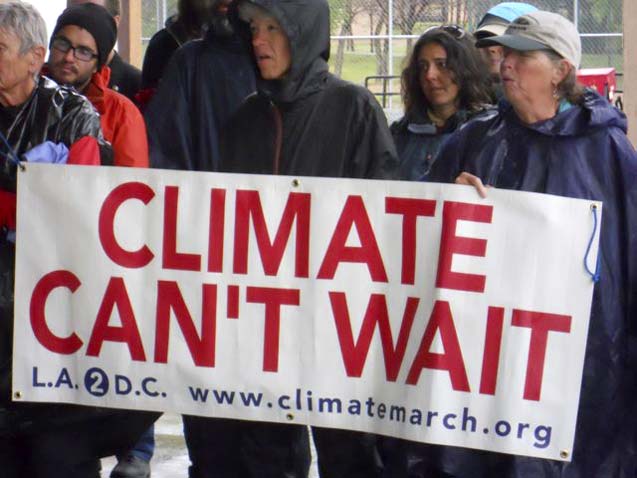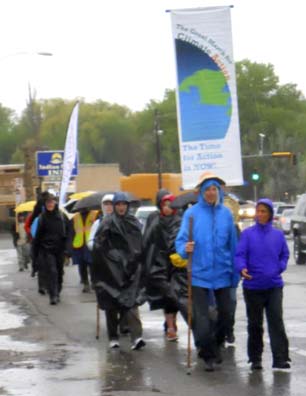
Two thousand miles lay ahead for the nearly 40 marchers who departed from Los Angeles in February and will arrive in Washington, DC, in November. Their feet tell the story of walking a thousand miles for climate justice. Their eyes look across the United States.
The Great March for Climate Action threads through small towns, big cities and wide-open wilderness. In each area, local residents join the marchers, who also visit schools, churches and community organizations, raising awareness about the causes, effects and impacts of climate change on our society. If left unaddressed, climate change could reach catastrophic levels, heralding the collapse of modern civilization and ultimately, the extinction of the human species.
Critics of the march say it is mainly symbolic, yet in one small Northern New Mexico town, the climate marchers had a tangible effect: The local newspaper reported on their arrival. While this may seem insignificant, the newspaper in question, like many others across the country, does not report on the subject of climate change. The arrival of a cross-continental delegation of climate marchers who have been traveling through major cities, small towns and the state capitol of New Mexico received one of the first mentions of climate change by the newspaper. This is one of the main goals of the climate march: to raise awareness of the issue in a nation that is ill-informed and often ignorant of the science and reality of climate change.
While mainstream media has remained quiet on the defining issue of our time, alternative journals have been reporting tremendous news about the climate justice movement. The Cowboy and Indian Alliance erected teepees on the Washington Mall to protest the Keystone XL pipeline. Four hundred students were arrested in an act of civil disobedience in Washington earlier in 2014. Germany is setting world records for renewable energy development to fight global warming. Seventy-five thousand citizens have sworn the KXL Pledge of Resistance to engage in civil resistance to the Keystone XL pipeline. Every week, numerous climate justice or fossil fuel extraction demonstrations occur in cities and towns across the nation. Small and large-scale solar and wind installations are among the most rapidly growing sectors of our stagnant economy.
 Great March for Climate Action. (Credit: Dariel Garner)There have been some breakthroughs: in 2012, Hurricane Sandy broke the almost deafening silence on climate change during the presidential campaigns and more recently, the Los Angeles Times announced that it would no longer publish the articles or opinions of climate change deniers. Yet, in general, mass media is shifting slower than the Titanic on this issue, leaving alternative journalism and independent media to pick up the slack. Will newspapers, television and other media shift fast enough to give citizens the information they need to make wise decisions regarding climate change? (Listen to Occupy Radio interview climate marcher, John Abbe)
Great March for Climate Action. (Credit: Dariel Garner)There have been some breakthroughs: in 2012, Hurricane Sandy broke the almost deafening silence on climate change during the presidential campaigns and more recently, the Los Angeles Times announced that it would no longer publish the articles or opinions of climate change deniers. Yet, in general, mass media is shifting slower than the Titanic on this issue, leaving alternative journalism and independent media to pick up the slack. Will newspapers, television and other media shift fast enough to give citizens the information they need to make wise decisions regarding climate change? (Listen to Occupy Radio interview climate marcher, John Abbe)
In Northern New Mexico for example, the local newspaper did not report on the 2013 Los Alamos National Laboratory study on the impacts of climate change on the Southwest forests. In eight years, the study found, the region will reach “megadrought” conditions as the new normal. As early as 2033, due to drought, stress, disease, fires and insects, the forests of the entire southwest may be gone. These statistics affect the lives of the local community in everything from real estate to tourism to disaster preparedness in homes and emergency funds set aside at the city and county level. It impacts the decisions around the dwindling water supply and also how the regional forests are managed for fire and disease prevention.
Yet, most citizens are unaware of the severity and immediacy of the climate change impacts happening around them.
The media is largely responsible for the general ignorance of the populace on a subject that 97 percent of the world’s scientists agree on.
The climate justice movement has struggled with this gross public deception for over 30 years. The Great March for Climate Action is one effort to break through the appalling lack of public awareness, but efforts are needed in every town and city. Even as increasing numbers of citizens sign up to commit civil disobedience to stop the Keystone XL pipeline or book flights to join the People’s Climate March in September in New York, regular, persistent local actions will be required to shake off the lethargy of public officials and local utilities.
Climate change needs to be on the lips of every city council member, county commissioner, state and federal representatives, BLM (Bureau of Land Management) managers, and public regulatory commission members. Citizens need to show up at meetings demanding to see adaptation studies, energy transition plans, disaster preparedness overviews and water management plans. People must contact their public utilities and go to public or shareholder meetings to raise concerns and demand shifts from fossil fuel-based energy sources into renewables. Individuals and groups can assist the divestment movement that has moved billions of academic investments out of fossil fuel stocks. The divestment movement can be expanded from educational institutions into individual investments, bank portfolios and other organizations.
The deafening silence on climate change must be countered by courageous truth-telling by ordinary people. Across the whole country, in small towns and large cities, the cry must echo again and again: climate change is real, and we are going to meet its challenges – not tomorrow . . . today!
Trump is silencing political dissent. We appeal for your support.
Progressive nonprofits are the latest target caught in Trump’s crosshairs. With the aim of eliminating political opposition, Trump and his sycophants are working to curb government funding, constrain private foundations, and even cut tax-exempt status from organizations he dislikes.
We’re concerned, because Truthout is not immune to such bad-faith attacks.
We can only resist Trump’s attacks by cultivating a strong base of support. The right-wing mediasphere is funded comfortably by billionaire owners and venture capitalist philanthropists. At Truthout, we have you.
Truthout has launched a fundraiser to raise $38,000 in the next 6 days. Please take a meaningful action in the fight against authoritarianism: make a one-time or monthly donation to Truthout. If you have the means, please dig deep.